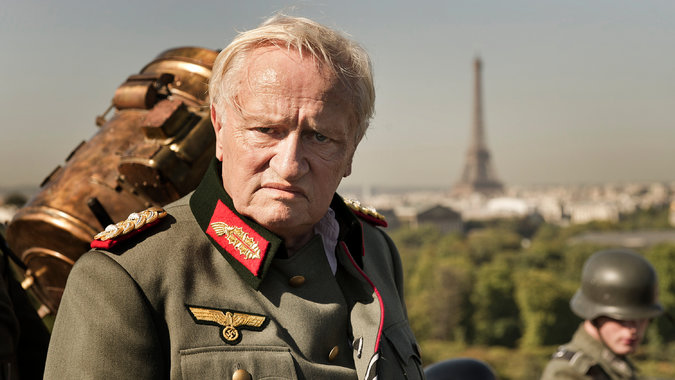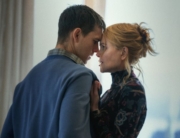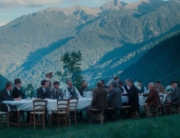Diplomacy hones in on the pivotal days of August 1944, intensely remaking scenes from René Clément’s all-star epic Is Paris Burning? (1966). The future of Paris hinges on how the Swedish consul influences the decisions of the last Nazi governor, who was promoted by Hitler for the specific task to lay the city waste if the Allies approached. How can it be suspenseful when, of course, we know that the City of Light survived? Because director Volker Schlöndorff’s occasionally opened-up adaptation of Cyril Gely’s play showcases two mesmerizing actors reliving of how two individuals negotiating can make history.
Headquartered in an ornate hotel suite redolent of Napoleonic court intrigue, General Dietrich von Choltitz is embodied by Niels Arestrup (Gert Fröbe in Clément’s film). A Prussian aristocrat and professional soldier, he has so efficiently followed Nazi orders in military campaigns through Western Europe, on the Eastern Front, and in Italy that he would later be charged with war crimes for the brutal attacks he led on civilians. He’s also one of the few high-level officers Hitler trusts after the July 20th assassination attempt.
Surrounded by maps and blueprints, the general is already directing his demolition experts to set explosions on Seine bridges and landmarks, including the Eiffel Tower, the Louvre, and Notre-Dame Cathedral. Awaiting his command from the rooftop, his loyalists, along with a very reluctant French engineer, are setting up charges deep in the notorious sewers, like a 20thcentury Les Misérables with dynamite.
Representing neutral Sweden is the French-born consul Raoul Nordling (an urbane André Dussollier, played by Orson Welles in Clément’s version). Jan Troell’s The Last Sentence earlier this year scrutinized Sweden’s problematic neutrality. But the wily consul has already been able to negotiate a political prisoner exchange, and he angles for a ceasefire while pockets of the Resistance try to take over official buildings and set up barricades in the streets (more Les Miz associations, but we hear Beethoven, not “La Marseillaise”).
The fictionalized pretense that the consul has been spying on the general all along through secret passages is a bit too convenient (he also hangs around to surreptitiously listen in on messages and meetings). Nevertheless, the heart of the tense film is how Nordling wins the heart and mind of one man. Both men first have to agree how the potential destruction of Paris is more symbolically important for the Allies and the Nazis than its military significance, outweighing the Nazis’ ruin of Warsaw and the Allies’ bombing of Dresden.
Responsibility for the very real possibility of retaliation from both sides hangs heavily over their anguished debate. While spectacular views of Paris loom outside his window, the general’s stress rises with intermittent asthma attacks. He tactically weighs his future, and the consul plays on von Choltitz’s concern for his family with increasingly urgent and complicated proposals for getting them to safety in Switzerland.
An interruption by an SS delegation threatens the negotiation—until they insist that their requisition of a shopping list of specific masterpieces from the Louvre (with The Monuments Men on their tail) trumps Hitler’s instructions to destroy that museum. The personal greed and corruption of this formerly frightening elite force helps to show von Choltitz the hollowness of the Reich’s glorious cause. Still, he will need to cannily weigh how to save Paris along with himself and his family.
While this specific encounter is less fact-based than Michael Frayn’s play Copenhagen, about a 1941 meeting between the scientists Niels Bohr of Denmark and Germany’s Werner Heisenberg, the engrossing give and take here plays out like My Dinner with Andre with much, much higher stakes. And these two men did eventually get to commemorate a reunion in Paris.







Leave A Comment